The Russian farmhouse ale expedition
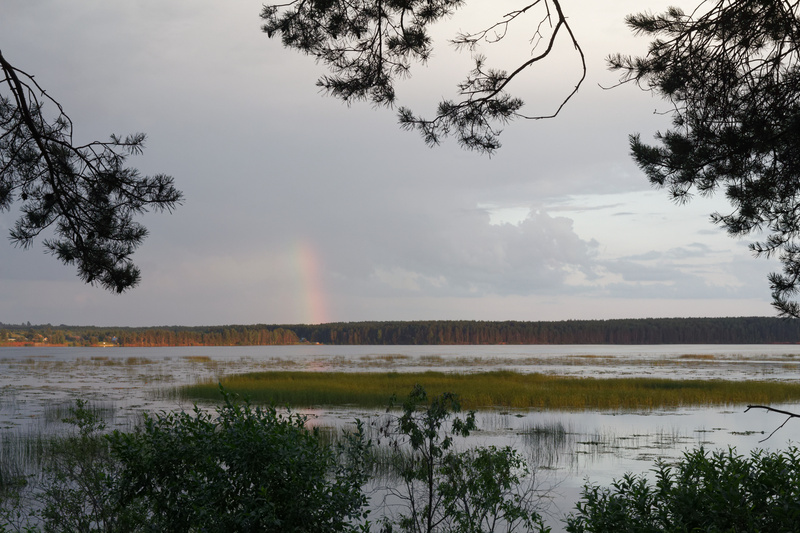
Rainbow over Belaya Kholunitsa lake, Kirov oblast |
I used to think that Russia was a land of vodka, and that the Russians had no beer tradition. That was foolish of me, because the Russians grow grain, and that means they also brewed beer. According to Matti Räsänen[1], beer was an obvious part of every major celebration in peasant Russia, just like in all other northern European countries. Reading his description I googled a little, and quickly found a short video from 2002 showing farmhouse brewing still alive in Chuvashia.
Then, in 2016, some articles appeared about hop growing in Chuvashia, and I thought perhaps the time had come to take a serious look at Russian farmhouse ale. I started out by googling and emailing just about every single possible contact that I could find. The Chuvash national museum. The Chuvash hop growing institute. The people who wrote articles about Chuvashia. I got some responses, but nothing that led to anything. I tried joining VKontakte, the Russian version of Facebook. That got me a few messages from ladies in bikinies, but nothing else.
For a long time it felt like trying to break through a brick wall with my fingernails. I started thinking perhaps I should forget Russia and try to explore somewhere else instead. But slowly I began to make progress. Via Kvasovar I got some more Youtube videos of people brewing recently. On Reddit I got in touch with a Chuvashian man who said he'd help me find brewers. And then Kvasovar sent me some links that eventually led to a Russian brewer who was still active.
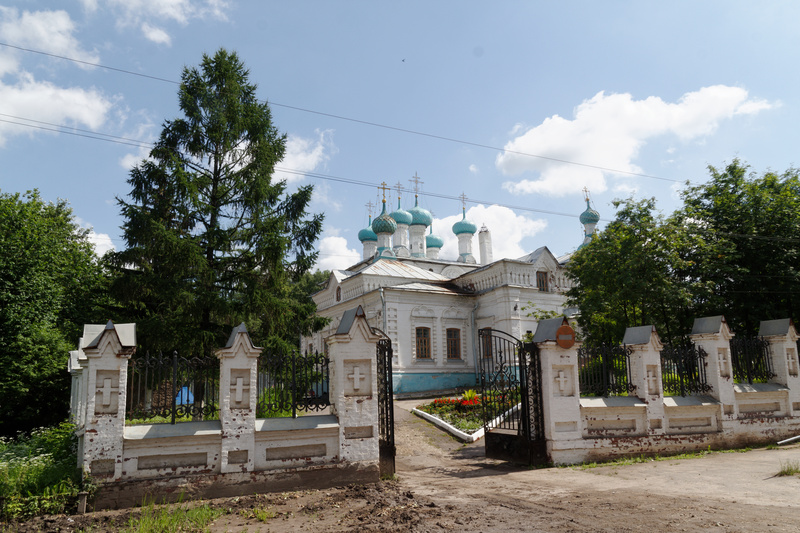
An old monastery in Slobodskoy, Kirov oblast |
This was all great, but I couldn't go there alone. I'd been to Russia several times before, so I knew I would need someone who spoke Russian. I didn't really know how to solve this, and tried various alternatives, none of which worked out. Then I found a Guardian article that mentioned Aleksandr Gromov (Sasha), who was planning "an ethnographic expedition", saying "Russia is a beer country, but we forget this. If we don’t preserve our own traditions, we will lose them." This was my man! But how to contact him? Eventually, I managed to get in touch with him on VKontakte, and together we followed various hints and traces we found online and via talking to people, to collect candidate brewers that we might visit.
Next step: make an itinerary. This quickly ran into two problems. First that Russia is, as everyone knows, huge. Second, that transportation is not easy. The brewers we'd found were spread out over an area roughly the size of France, but most of them were in places that were awkward to reach, and transportation links often ran the wrong way. Then there was the question of how to travel. Should we rent a car and drive thousands of kilometers on Russian roads? Or use the train most of the time, and local drivers?
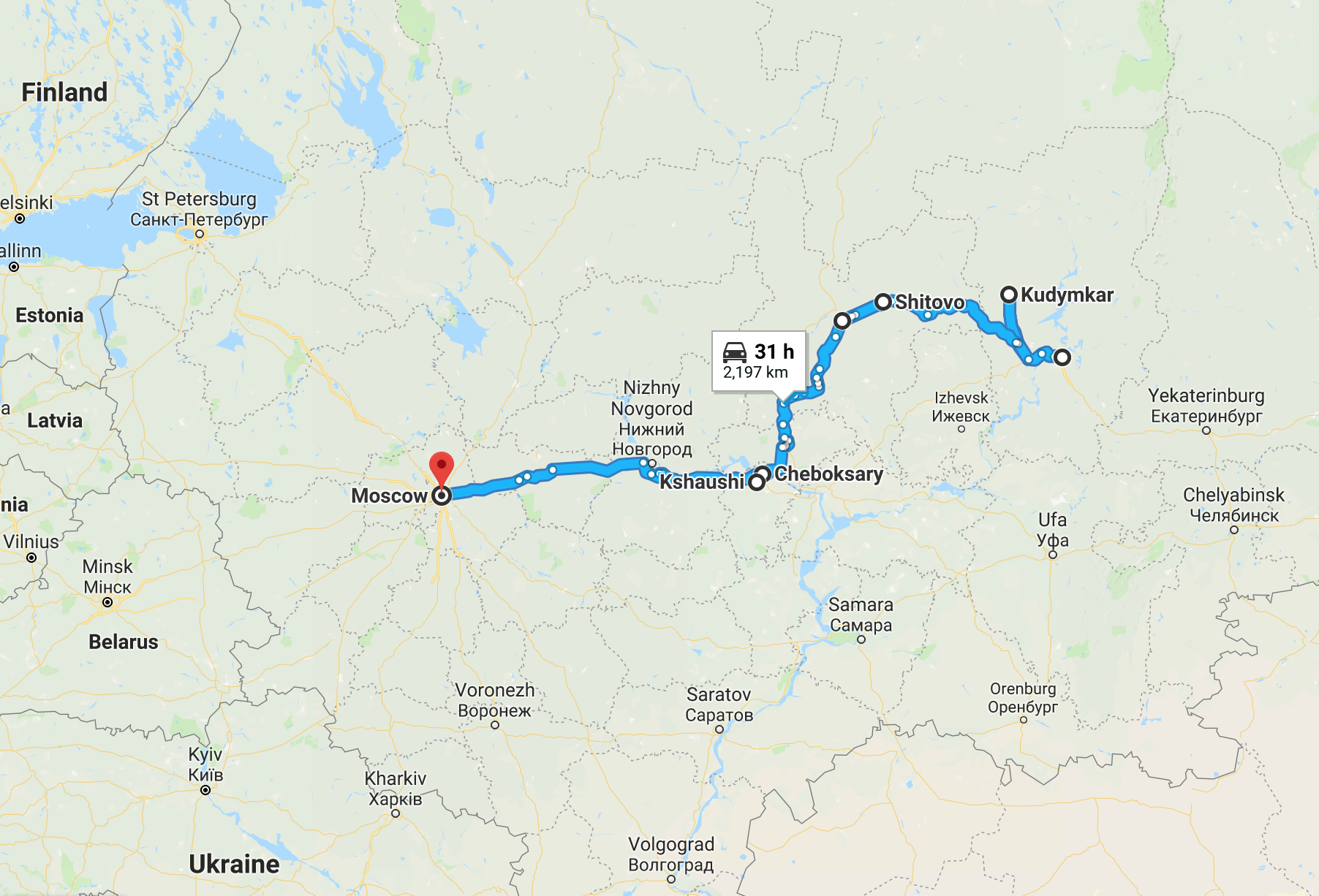
Our route from east (Perm) to west (Moscow) |
Eventually, we decided we'd only have time to visit three brewers in a week, simply because of the time it took to travel between them. So we settled on the route above, based mostly on train, since a train line runs Perm - Kirov, and Cheboksary - Moscow. That meant we had to do Kirov - Cheboksary by bus, and rely on the locals to help us get from the cities out to the brewers in the countryside.
Before I left, several people joked about whether this was a safe thing to do or not. I'd been to Russia several times before, however, so I was not worried about my safety. And just as on earlier visits I found that the Russians I met were unfailingly helpful, friendly, polite, and simply very, very nice. Of course, waiters, conductors and so on could be more cold and unhelpful than one is used to in the West, but overall I really had no worries throughout the trip.
I was worried before leaving, though. So worried it sometimes kept me awake at night, because it was painfully clear to me how fragile the entire trip was. I'd never actually met Sasha, and now I was going spend every waking minute with him for over a week. And not only that, but he was my guide and translator. What if he got sick? Or if we'd forgotten to book something, missed a connection, or otherwise screwed up the timing? It could mean the ruin of the whole trip, after 9 months of planning. It could mean basically no research trip in 2017 and having to wait until 2018 for the next chance.
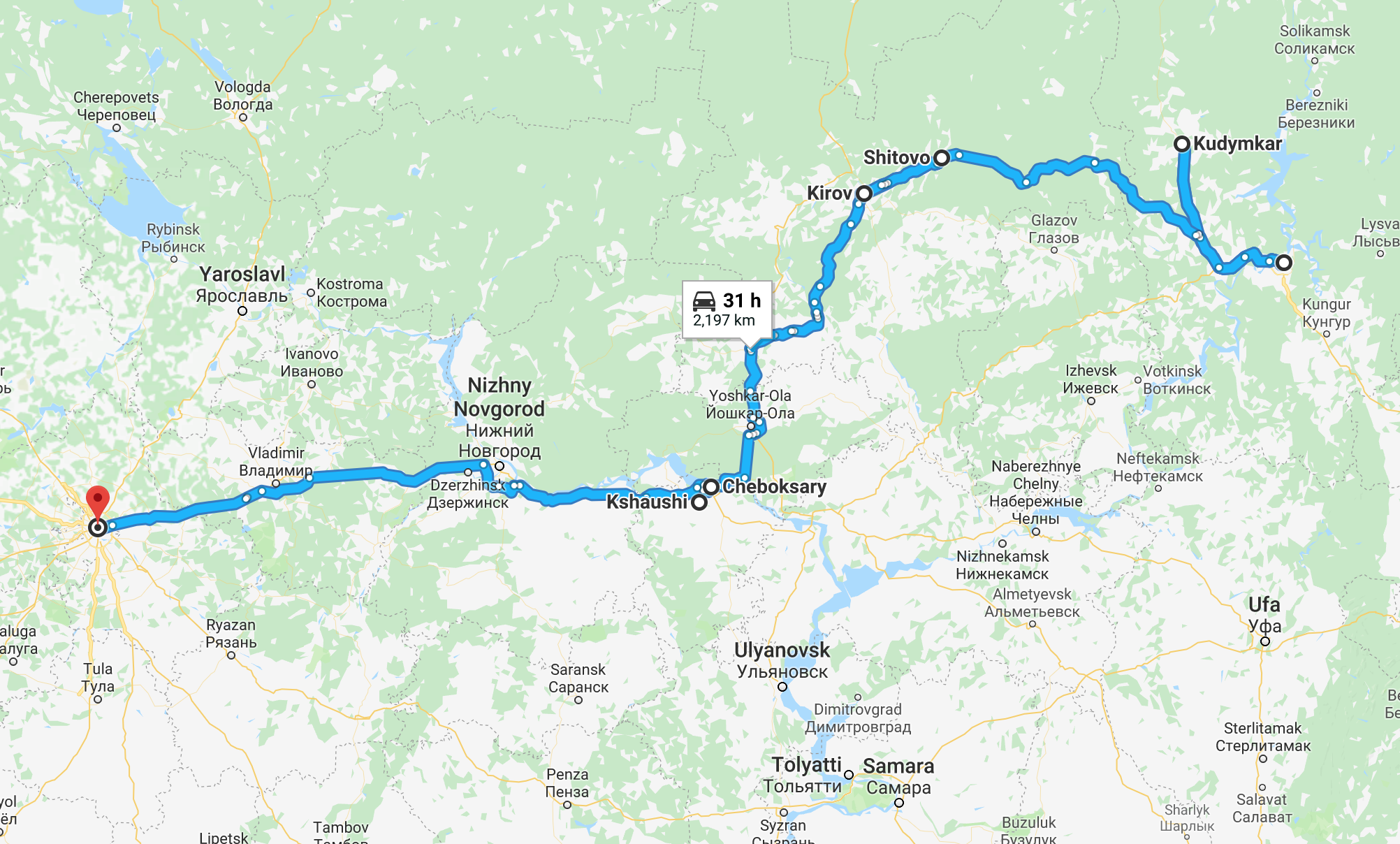
Route in more detail |
But in the end it all worked out flawlessly. Well, perhaps not flawlessly, but at least according to the plan. Because travel in Russia is not like in the West. The train was very comfortable and a lovely way to travel, but the schedules were not exactly friendly. We had to board the train in Perm for Kirov at 0250 at night, we thought. That seemed awkward, but manageable, until Sasha remembered that the Russian railways run on Moscow time throughout the entire country, so in reality we would be boarding at 0450, which I guess is kind of in the morning. We thought we'd have to sit on the train station stairs from midnight to 0450, but we were kindly offered somewhere to stay that night, then transferred to a bed on board the train, so in the end it wasn't too bad.
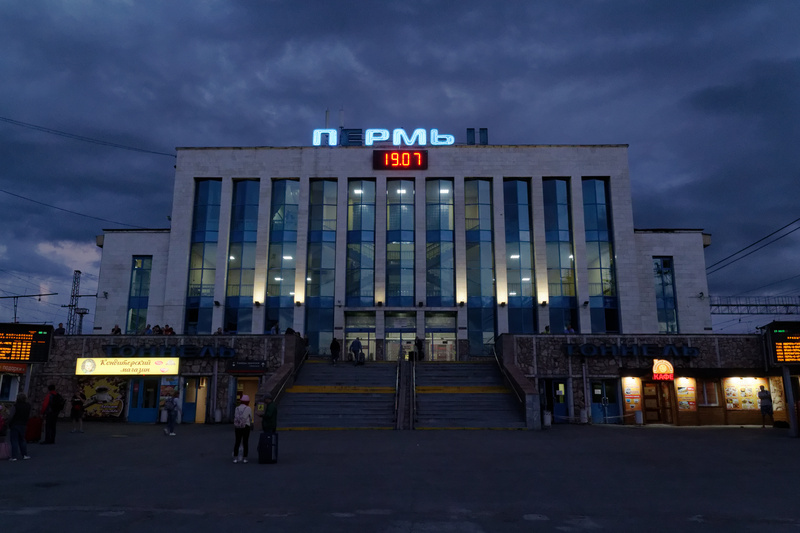
Perm II railway station (there is no Perm I) |
The bus trip from Kirov to Cheboksary was less pleasant. It was what the Russians call a marshrutka, a minivan crammed to the rafters with passengers. I got a seat, but only managed to fit into it by wedging my knees against the seat in front, and squeezing the small of my back into my own seat. And as bad luck would have it, I was placed on top of the hind left wheel, so my left foot had to be raised about a foot to fit. In this position I spent the 8 hours the trip lasted.
The schedule was really for a trip of 10 hours, but the driver decided to crack on with all possible speed so he could get off work earlier. This was welcome, except it meant that toilet breaks were cut to an absolute minimum. After three hours we had one lasting five minutes.
Then, after six hours, we got all of 15 minutes in Yoshkar-Ola. At this point I would have liked a toilet visit, but the bus station only had squat toilets, so I went off in search of alternatives. I found a basement restaurant nearby, but there was already a woman queuing for the toilet. I took position behind her, mindful that 3 of my 15 minutes were already gone. Then the door opened, and a woman came out of the toilet, asking for something from the waitress behind the bar. The waitress, a huge mountain of a woman, resembling most of all a depressed and angry bulldog, picked up three small, thin table napkins and gave them to the first woman, who went back into the toilet. At this point I gave up, and returned to the bus.
I was more than a bit relieved when the bus drove onto the bridge over the Volga, which meant it was only a short drive left to Cheboksary.
Driving by car around Kirov and Cheboksary was slow, because of the state of the roads and the amount of traffic, but basically OK. The 200-km drive from Perm to Kudymkar (and back again) was a different story. I was surprised to find that instead of the usual car, that day we were going to drive in a gigantic SUV so big I had to climb up to get into it. But there was a reason. The drive until we got to Sherya was bumpy and restless, because of the poor state of the road.
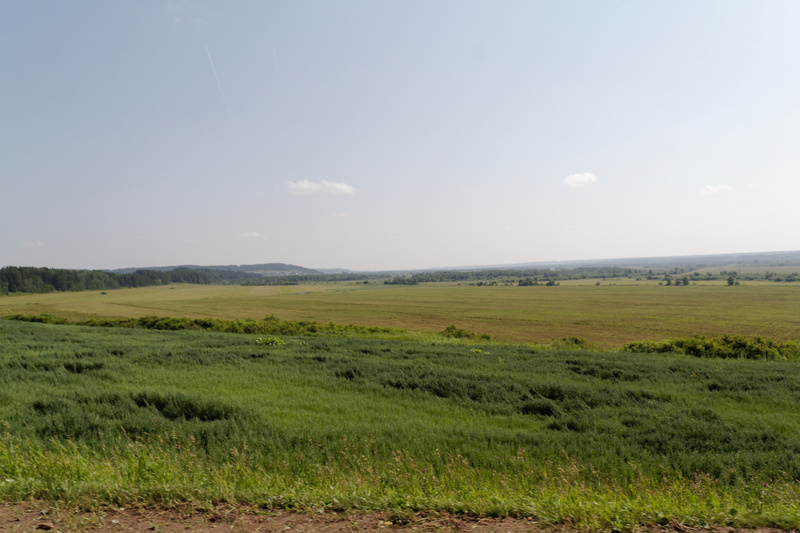
On the road to Kudymkar ("near" Perm) |
Then we left the main road, still going at high speed, and the car soon started hitting ruts in the road so frequently it was essentially vibrating, while shaking and heaving like a boat in bad seas. Often, the jolts were so bad I was afraid of my head hitting the ceiling. Then it suddenly got even worse.
Ivan, in the passenger seat, turned around, saying "that was the end of the good road." I looked at him. "The good road? I thought that road was pretty poor?" Ivan chuckled, then showed me a photo on his phone of a car wheel, still attached to the car, crushed by some huge force. "That's Russian roads for you," he said, laughing.
Before long the talking grew less as we were jolted, bumped, shaken, and stirred until I at least started feeling queasy. I remember looking out the window at the fields and trees passing by and realizing that if I kept looking sideways I would vomit within a few minutes. For the rest of the trip I stared fixedly out the front window as if hypnotized.
And then, mercifully, we rolled into Kudymkar, ready to visit the first brewer.
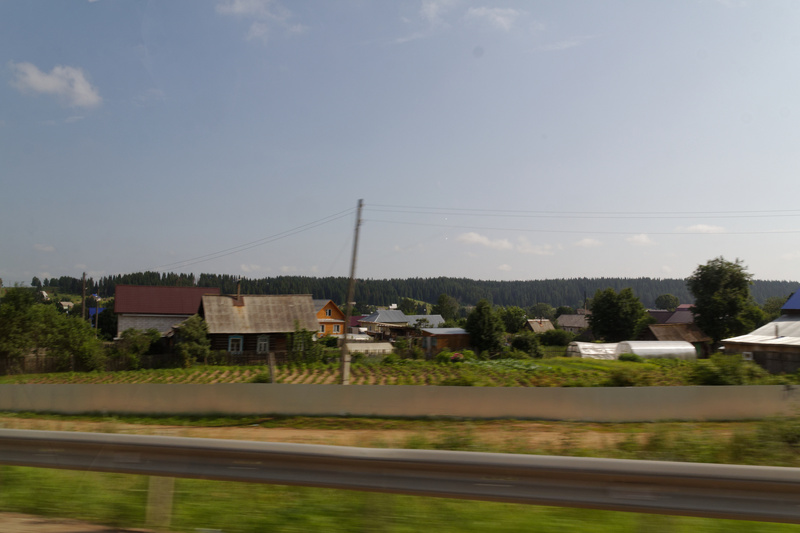
Passing a village on the road to Kudymkar |
Sources
[1] Vom Halm zum Fass, Matti Räsänen, Kansatieteellinen arkisto, Helsinki, 1975.
Similar posts
Oven beer in central Russia
Dmitriy stopped the car outside his dacha (summer house) in the tiny village of Shitovo, and jumped out
Read | 2018-11-07 19:31
From Krakow to Lviv
We really wanted to visit Lviv during our 2006 holiday in Ukraine (photos), because of the praise heaped on it in the guidebook, and in travel reports in various newspapers
Read | 2007-09-19 20:35
Comments
Knut Go - 2018-08-28 19:02:13
Kjempeartig! Jeg maa lete opp flere av dine inserat :-)
DAVID NILSEN - 2018-08-31 15:58:55
This is fascinating. I can't wait to hear the rest of your trip!
Collin - 2018-09-06 01:10:44
This is great. I can't wait to read the rest!
Anton - 2018-09-15 04:07:58
Hello, i think you visited wrong places in Russia.Many small beer productions in the centrall part of Russia. And you need not go so far. But may be you like dificult.))
Dennis - 2024-04-10 19:11:09
>> The drive until we got to Sherya was bumpy and restless, because of the poor state of the road.
Nowadays that road is much closer to an A-grade motorway. So many changes in less than 10 years, lol...